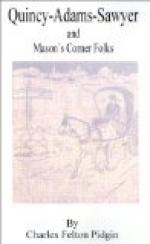“Just now! Right here!” cried the Professor; and before Huldy could interpose he had arisen from his chair and had fallen on his knees before her.
Huldy looked at him with a startled expression, then as the whole matter dawned upon her she burst into a loud laugh. The Professor looked up with a grieved expression on his face. Huldy became grave instantly.
“I wasn’t laughing at you, Professor. I’m sure I’m grateful for your esteem and friendship, but it never entered my head till this moment that you had any idea of asking me to be your wife. What made you think such a thing possible?”
The Professor was quite portly, and it was with some little difficulty that he regained his feet, and his face was rather red with the exertion when he had succeeded.
“Well, you see,” said he, “I never thought much about it till that city feller came down here to board; then the whole town knew that you and ‘Zeke Pettengill had had a fallin’ out, and then by and by that city feller who was boardin’ with your folks went away, and I kinder thought that as you didn’t have any steady feller—”
Huldy broke in,—“You thought I was in the market again and that your chances were as good as those of any one else?”
“Yes, that’s jest it,” said the Professor. “You put it jest as I would have said it, if you hadn’t said it fust.”
“Well, really, Professor, I can’t understand what gave you and the whole town the idea that there was any falling out between Mr. Pettengill and myself. We have grown up together, we have always loved each other very much, and we have been engaged to be married—”
“Since when?” broke in the Professor, excitedly.
“Since the day before I last engaged you to give me music lessons,” replied Huldy.
What the Professor would have said in reply to this will never be known; for at that moment Mrs. Mason opened the door, and looking in, said, “The Deacon’s come.”
Strout grasped his hat, and with a hurried bow and “Good morning” to Huldy, left the room, closing the door behind him. It must be said for the Professor that he bore defeat with great equanimity, and when he reached the great kitchen and shook hands with Deacon Mason, who had just come in from the barn, the casual observer would have noticed nothing peculiar in his expression.
“Waal, Deacon,” said he in a low tone, “did you git the money?”
“Oh, I’ve ’ranged ’bout the money,” said the Deacon; “but I had a talk with my lawyer, and he said it wasn’t good bizness for me to pay over the five hundred dollars till the store was actually knocked down to you. Here’s that note of yourn that the town clerk endorsed las’ night. Neow, when the auctioneer says the store is yourn I’ll give yer the five hundred dollars and take the note. I’ll be up to the auction by half-past two, so you needn’t worry, it’ll be jest the same as though yer had the money in yer hand.”




